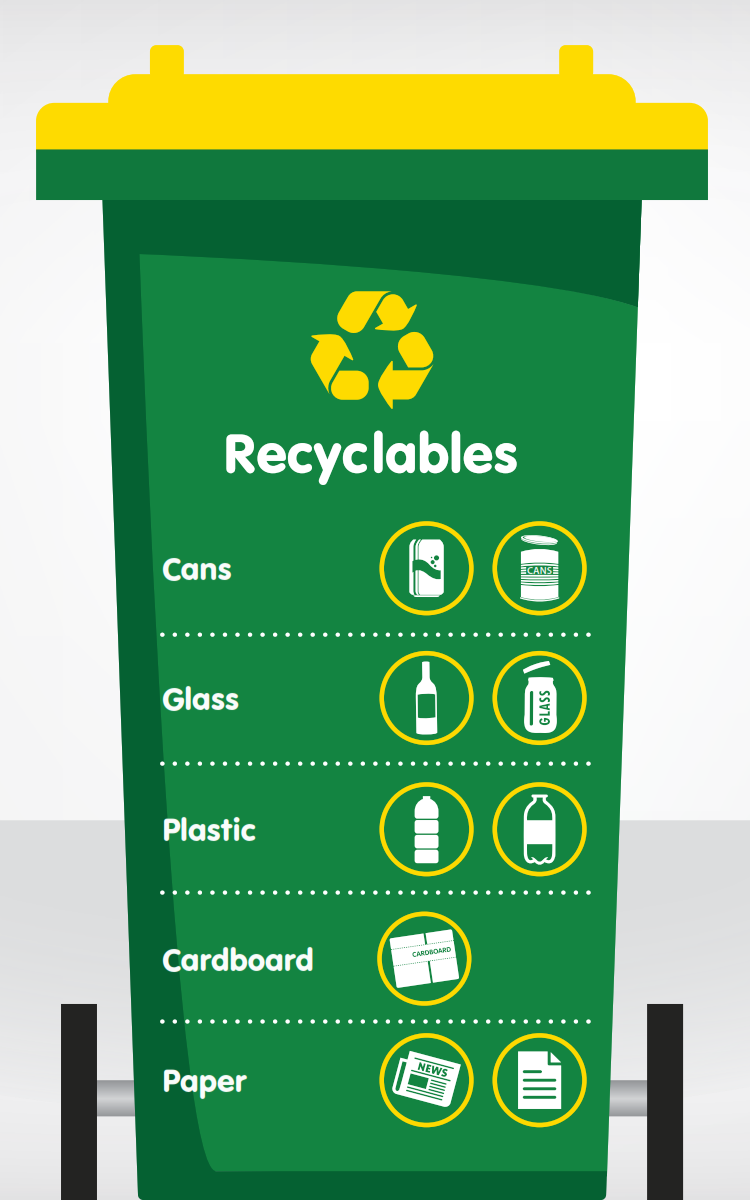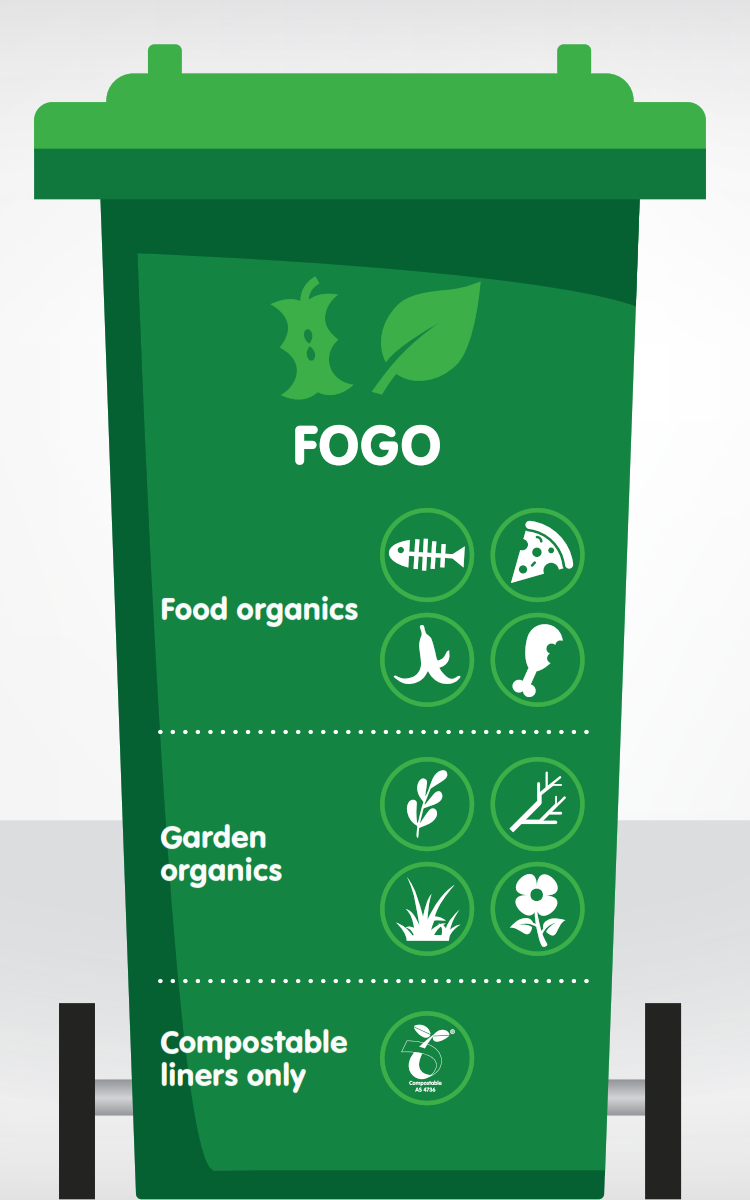Managing Your Waste
On this Page:
What goes in your Recycling bin?
The items in your recycling bin are sorted, baled and transported to be turned into new products.
| RECYCLING BIN (yellow lid) |
| Keep your recycling simple and remember only 5 things go in your recycling bin: |
- Paper (NO tissues or paper towel)
|
|

|
- Plastic containers and bottles
|
|
|
|
|
|
Make sure that containers are rinsed with lids removed. All items should be put loose in the bin (not in bags).
Do not put any other items including soft plastics, dirty containers, batteries, clothing or rope in your recycling bin.
|
Not sure about whether an item is recyclable? Visit Recycle Right for a comprehensive list, or download the Recycle Right app.
Your Recycling bin is collected fortnightly. Excess household recycling can be dropped off FREE at Fossicker’s Tip Shop at the Hanrahan Road Waste Facility.
See your recycling in action! Take a look at what happens to your recyclables after they are collected by the truck.
What goes in your FOGO bin?
The organic waste from your FOGO bin is transported to a local facility and composted.
| FOGO BIN (lime green lid) |
| Your Food Organics and Garden Organics bin is the place for all food waste, including: |
- Fruit and vegetable scraps
|
|
 |
|
|
|
|
|
- Coffee grounds and tea leaves
|
| Other organics materials that can go into the FOGO bin: |
|
|
|
- Kitty litter (paper or clay based)
|
- Soiled paper, cardboard, napkins and tissues
|
|
|
Only organic waste goes in this bin. The contents of this bin will be composted, so it’s important to keep other items OUT.
Food waste can go into your FOGO bin either in a compostable liner, wrapped in newspaper or loose in the bin. Please make sure all food packaging is removed and placed in the correct bin - plastic/foam packaging, stickers and labels will contaminate the compost.
Only use compostable liners (with the AS4736 seedling logo) as these will break down naturally during the composting process. Biodegradable or any other plastic bags/liners must NOT go in your FOGO bin as these will not break down.
Residents can pick up a FREE roll of compostable liners every six months from Fossicker’s Tip Shop at the Hanrahan Road Waste Facility.
Your FOGO bin is collected fortnightly, with an additional weekly collection for 8 weeks from mid-December to mid-February. Excess garden waste only (no food waste or FOGO bins) can be taken to Soil Solutions at 100 John St, Milpara. Fees apply, or you can use your ratepayer Green Waste Pass. For larger garden prunings, the City offers an annual Bulk Green Waste Collection – visit the Bulk Waste Collection page for more information.
What happens to your FOGO?
Got more questions about FOGO? Download our FOGO FAQs or contact us on [email protected].
What goes in your General Waste bin?
The things in your General Waste bin are sent to landfill.
| GENERAL WASTE BIN (red lid) |
| This bin is for items that can’t be recycled or composted, such as: |
- Nappies and hygiene products
|
|
 |
- Tetrapaks and long life milk cartons
|
|
|
|
|
Do not place batteries, electronic items, lightglobes, chemicals, paint or flammable items in your bin. These items are dangerous in trucks and waste facilities, but can be dropped off at Fossicker’s Tip Shop instead.
If you regularly have too much waste for your General Waste bin, visit the ‘What to do if you have too much waste’ section on this page for more information.
What doesn’t go in any bin?
| DROP OFF ONLY |
|
Some items MUST NOT go in any of your household bins. Household hazardous waste (HHW) includes unwanted products that are corrosive, flammable, toxic or reactive. They are often things that are harmful to you, your family, your pets or the environment, and shouldn't go in any kerbside bin. These items include:
|
|
|
- Electronic waste (TVs, computers, printers, mobile phones)
|
- Household chemicals and poisons
|
|
|
|
|
|
|
|
|
| You can drop off household quantities of these items FREE at Fossicker’s Tip Shop at the Hanrahan Road Waste Facility. These items will then be collected and recycled or safely disposed of. Search for more B-cycle battery drop off points, and look out for local locations which accept other items. |
For a full A-Z list of what goes in which bin, visit Recycle Right.
Tips to reduce your waste
Check out our Tips to Reduce Waste and make sure you:
- Recycle your paper, cardboard, cans, plastic containers and glass bottles and jars.
- Take items such as batteries, light bulbs and e-waste to the drop off point at Fossicker's Tip Shop.
- Avoid excess packaging wherever possible.
- Squeeze the air out of rubbish bags.
For more information on reducing your household’s rubbish, visit www.wastesorted.wa.gov.au.
Our Waste Team offers free home visits to discuss your household's waste needs. Please phone 6820300 to book.
What to do if you have too much waste
Making the most of your FOGO bin means less rubbish in your General Waste bin. Most households using the FOGO bin for food and garden waste still have space in their General Waste bin at the end of the fortnight. Albany households have done an incredible job adjusting to the FOGO system, and together we reduced the amount going to landfill from our kerbside general waste bins by more than 30% – but we know it hasn’t been easy for everyone.
Our Waste Team is here to help, and we encourage you to get in touch with us if your household regularly struggles with an overfull general waste bin. Residents with extra waste due to medical needs can contact our Waste Team on 6820 3000 or [email protected] to discuss additional free options.
Bin auditing and contamination process
Bin contamination refers to when the wrong thing has been put in the wrong bin. When bins are contaminated, it can mean that waste that could have been recycled or composted will instead go to landfill.
Identifying contaminated bins is an opportunity to educate residents on correct waste sorting, as often putting things in the wrong bin is an honest mistake. Other benefits include:
- It helps to identify areas (such as unit complexes) that may need additional assistance;
- It reduces the risk of injury to workers and damage to sorting equipment; and
- Most importantly, it increases the amount of waste that is recovered rather than sent to landfill.
The City of Albany and our waste contractors have systems in place to identify and address contamination. This includes kerbside monitoring and in-truck video surveillance to allow drivers to observe the contents of bins as they are emptied, and regular audits of kerbside bins by our contractor's Education Officer and City of Albany staff.
If contamination is identified in your bin, these are the steps taken:
- A sticker is attached to the bin which notes the items identified. The sticker requests that the resident removes the contamination, and to contact Cleanaway to arrange for the bin to be checked and arrangements made for it to be emptied. (Note: on occasion it may not be safe for the driver to stop and attach a sticker to the bin).
- The contractor includes the property address and type of contamination in a report to the City.
- The City issues a letter to the property, reiterating the contamination that was identified and providing additional information on correct waste sorting.
We encourage any resident who receives a contamination sticker or letter to contact Cleanaway or the City's Waste Team to discuss any questions or concerns. We are happy to answer any questions, to provide additional educational resources, or to arrange home visits to assist with correct waste sorting.
A process is in place for residents who repeatedly contaminate their bins, which includes a second warning letter and the potential for waste services to be temporarily suspended.
| For more information on the contamination process, contact: |
| Cleanaway's Education Officer on 6801 7500 |
| City of Albany's Waste Team on 6820 3000 |